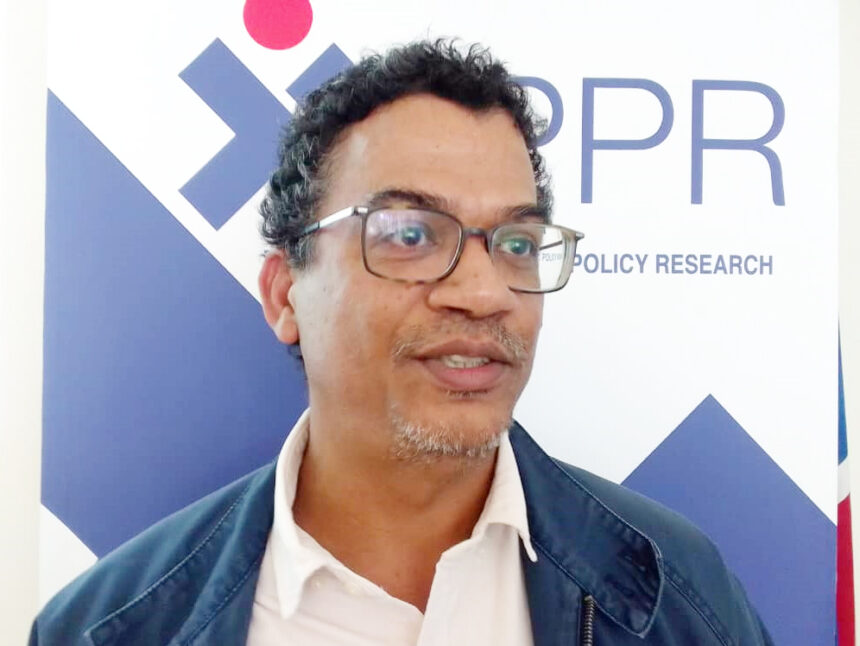Rudolf Gaiseb
The first publication of the three-part series of a report launched by the Institute for Public Policy Research last week says mandatory SIM card registration threatens the constitutional right to privacy.
“Since April 2024, mass state surveillance has become a reality in Namibia, as the country implemented the mandatory SIM card registration and data retention against the narrative, backdrop of national security” the report indicates.
IPPR’s research associate Frederico Links says the aim is to identify these narratives and push back the government from violating the public’s right to privacy.
“This first publication looks specifically at problematic African state narratives around national security and the impact of these sort of narratives that we are now seeing in Namibia on cyber-security and cyber-crime law-making,” Links said.
He added: “The consideration is primarily a state security consideration, and that security trumps privacy, which is a problematic framing for us. It’s a problematic narrative when it comes to a democratic society where we have an expectation of respect for human rights. The aim is to flag these problematic narratives, and encourage people to be critical of state security measures that seek to limit our rights online. We really should be pushing back against these sorts of narratives that ask of us and that encourage us to normalise invasive state surveillance through such mechanisms or measures as was card registration, for instance, that we should give up our right to privacy in the interest of state security.”
According to the report compiled with the Collaboration on International ICT Policy for East and Southern Africa (CIPESA), Namibian state authorities are using the same narratives, to greater or lesser degrees, that other African states have deployed, and that have become problematic across the continent.
“Mandatory SIM card registration is a form of mass surveillance, as it involves the indiscriminate collection and storage of personal details when a SIM card is registered in an individual’s name. Mobile phone users who opt out of the registration process do so on pain of being disconnected from the network. The effect of SIM card registration is that users cannot communicate anonymously without the potential for being tracked,” the report illustrates.
The report also highlights that while governments justify mandatory SIM card registration laws on the grounds that they assist in preventing and detecting crime, there is no convincing empirical evidence that mandatory registration in fact systematically lowers crime rates.
There are also no robust empirical studies showing that such measures make a difference in terms of crime detection, the report states.
Links believes SIM card registration is notoriously ineffective as a crime-fighting tool, as criminals are more likely to use creative workarounds to prevent themselves from being tracked.
He noted that while the power imbalance between the state and civil society and the news media is a real concern, it nevertheless remains the case that Namibian civil society and news media need to counter state national security narratives that could enable human rights’ violations, both online and offline, limit the emergence of robust online civic spaces, and undermine digital democracy.
“Targeted policy advocacy and sustained activism around the issues raised in this report should be considered viable to spread information about the state’s problematic national security narratives and framings in the context of cyberspace and digital technology law and regulation crafting and enforcement,” he said.
More than 185 other countries across the world have already implemented mandatory SIM card registrations.
The Communications Regulatory Authority of Namibia (Cran) introduced mandatory SIM card registration in mid-2022, and the government required all SIM cards to be linked to a Namibian ID, passport, or any other official identity document issued by the Namibian government or a foreign country, with the aim of finalising the process by the end of 2023. However, the process was extended to March this year.
Earlier this year, then information minister Peya Mushelenga said the ministry must ensure that SIM card registration continues to eliminate anonymous card users.
Through this, he said, cybercrimes will be minimised and those committing crimes will be traceable.
“This is an exercise that has been done in many countries around the world. Only three countries in Africa, including Namibia, have not finished this exercise. Hence, we are tasked to complete it,” the minister appealed.
“We must protect our institutions and individual end-users from cyber-attacks,” the minister said at the time.


